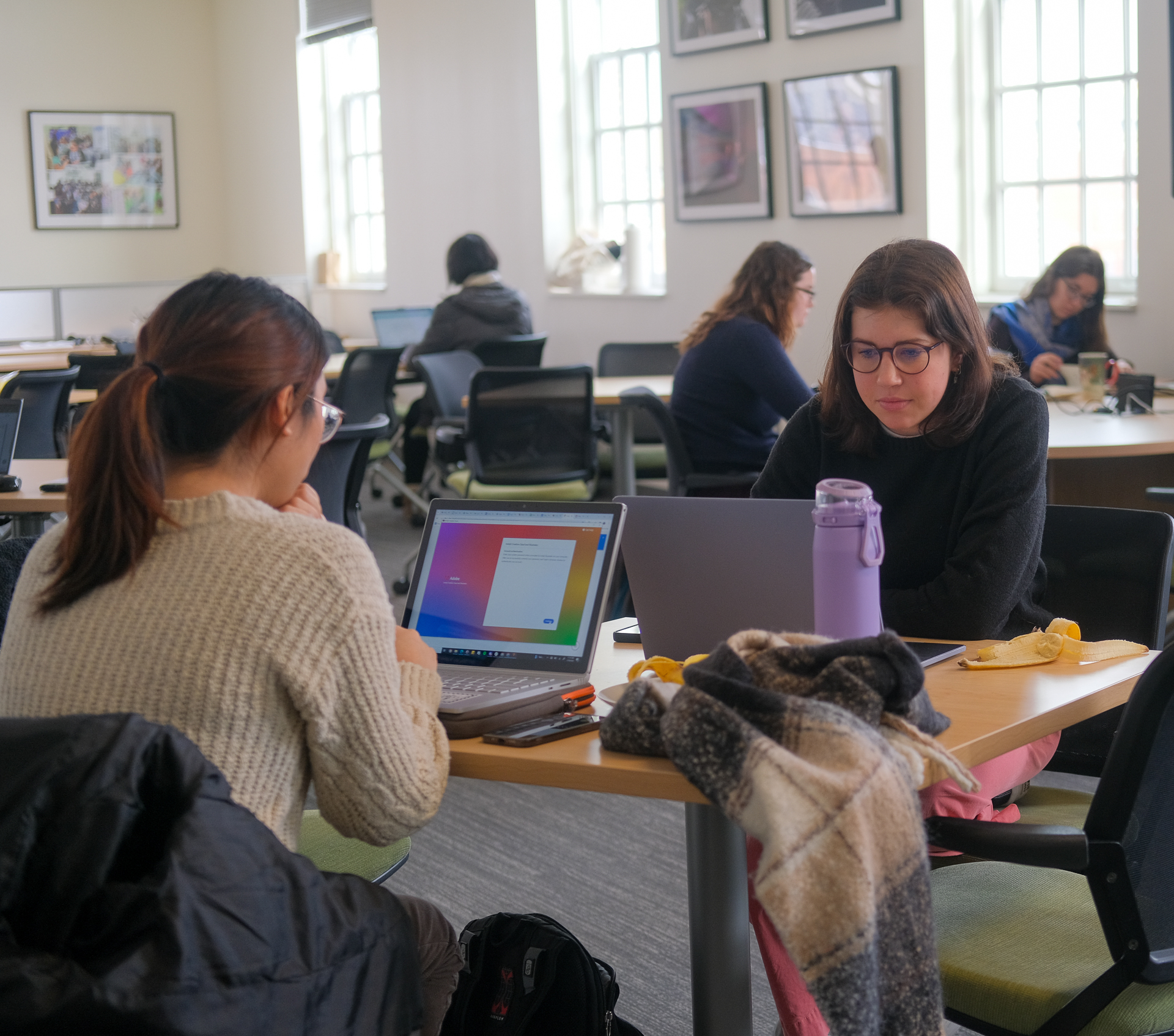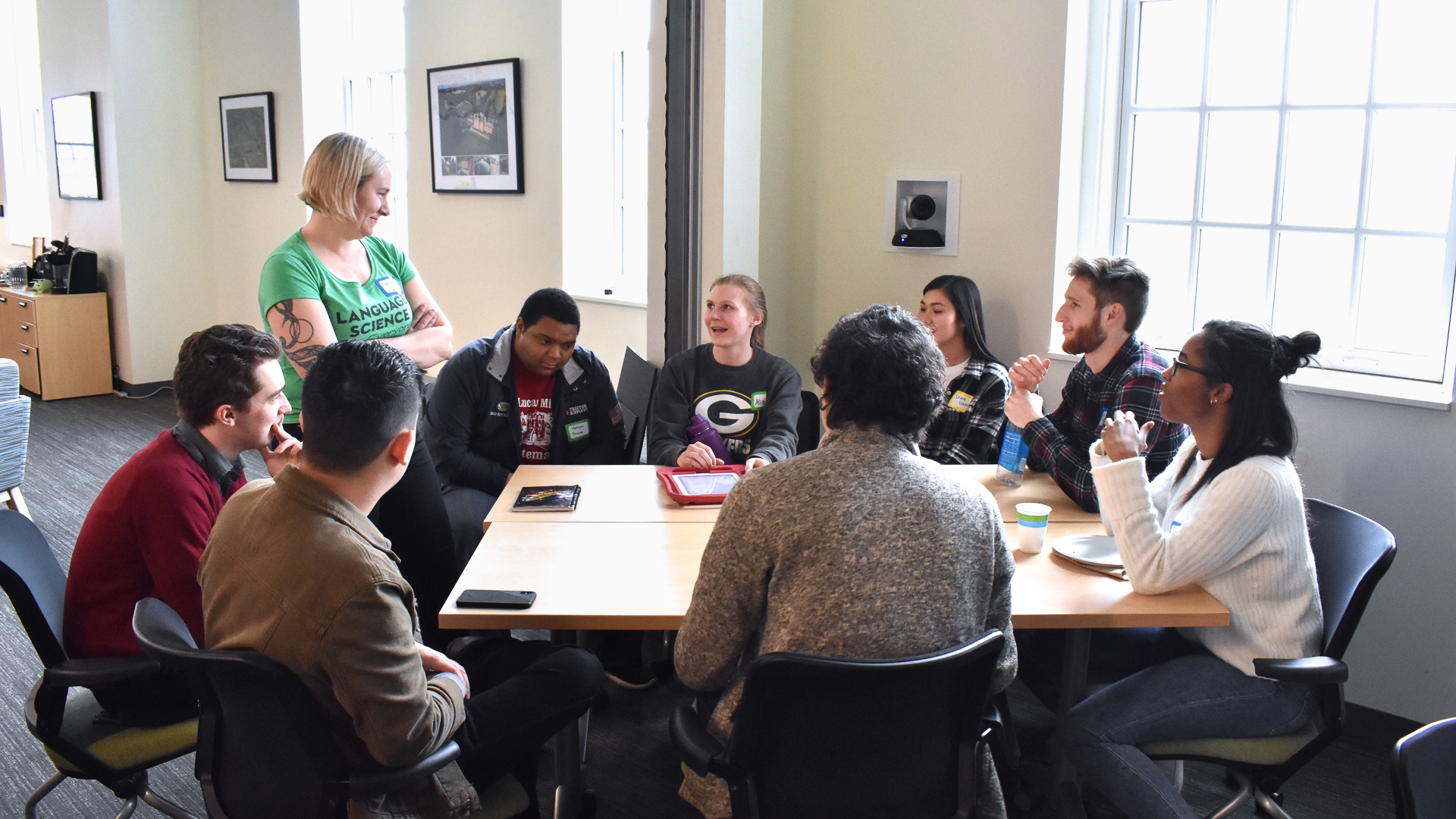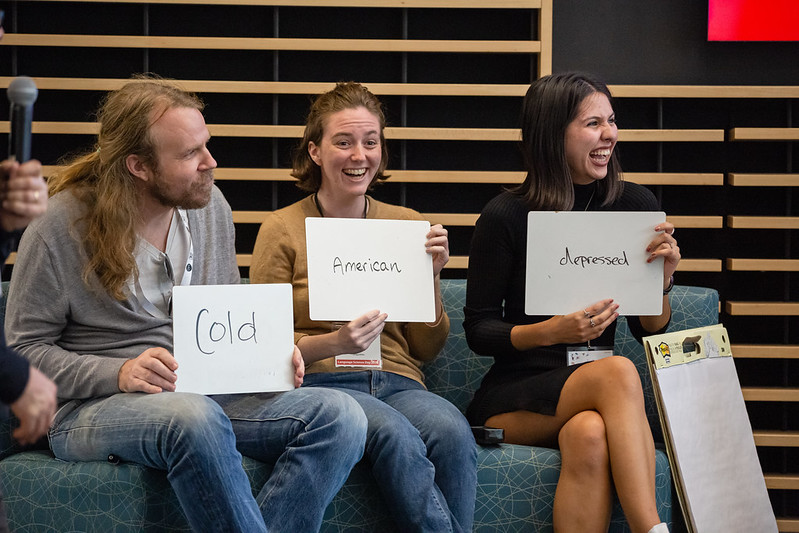Education
One of the Language Science Center’s major goals is to provide innovative interdisciplinary education preparing students to be leaders in diverse careers. Our programs are widely recognized for their innovation, especially in promoting student agency. At the graduate level they have attracted talented students and federal support.
In our educational programs and activities, we emphasize interdisciplinary communication, experiential learning, and student ownership. The Language Science Center does not offer any degree-granting programs.
If you’re here because you’re developing an interdisciplinary training program at your university, we have resources you may find helpful. The Language Science Fellows page has links to our full proposals for NSF IGERT and NRT training grants, as well as reports and evaluations of our programs.
Courses
MLSC 250: Lol that's not funny: Language change and linguistic creativity in online communication
(3 Credits)
Recent developments in technology, from texting to Zoom, have created new environments for human language use. Examining how communication is changing in these environments highlights humans' endless linguistic ingenuity -- ranging from new vocabulary and punctuation conventions to the use of hashtags, emoji and memes. At the same time, these linguistic innovations exemplify broader patterns of language change and diversity that have been documented and studied by language scientists. In this course, we will engage with the study of language variation and change through a survey of language use in different online environments, and will apply insights from linguistic research to analyze our own and others' language use in more nuanced ways.
MLSC 420/640: Language at the Museum: Engaging the Public in Language Science
(3 Credits)
2024 registration has closed. Stay tuned for more information and updates.
Students in the course must be able to commit to spending several hours per week at Planet Word during the term, and must arrange their own transportation to and from the museum. Learn how to skillfully and confidently conduct language science research and engagement in a public setting. Course topics include research design, research ethics, science communication, and informal science learning. Experiential learning component involves significant weekly hours outside of class engaging in hands-on research and interaction with visitors at a museum about language in Washington DC.
Recommended: Background in language science or related fields.
Undergraduate Opportunities
Students interested in the fundamental science and analysis of language can major or minor in Linguistics. An undergraduate degree in Hearing & Speech Sciences focuses on comparisons between typical and atypical speech, language, and hearing, and is the first step towards clinical qualification as a speech-language pathologist or audiologist.
Students often choose to pursue one of these language-focused degrees as part of a double major in another area. Common double majors include:
- Double major in Linguistics and an additional major offered by the School of Languages, Literatures, and Cultures.
- Double major in Linguistics and Psychology, for students interested in cognitive aspects of language.
- Double major in Linguistics and Computer Science, for students interested in computation and language.
- Minor in Second Language Learning/TESOL, for students interested in language teaching.
Though there are no undergraduate programs dedicated to Second Language Acquisition or Computational Linguistics, qualified students can request permission to take graduate courses within qualifying language science programs and departments.
Research Opportunities
By going beyond required courses, all undergraduate students have the opportunity to participate in cutting-edge research at the University of Maryland. Students can participate in research throughout the semester through volunteer, college credit, or paid opportunities. For especially in-depth research experiences, students can work full-time in a research group over the summer. Some undergraduate researchers go on to present their discoveries at international conferences or publish their findings in books or scientific journals.
Graduate Opportunities
The University of Maryland offers a wide range of graduate degree programs in language science fields, and interdisciplinary training opportunities. The Language Science Fellows program brings together a community of engaged graduate students who participate training and professional development activities that integrate with their program of study. Many students take on leadership roles organizing Language Science Center activities.
Degree Programs at UMD
The language science initiative provides students with the flexibility to create individualized programs of study involving combinations of faculty mentors.
PhD Programs
- Biology: auditory neuroscience
- Communication: disciplinary methods of inquiry, communication concepts and theories, specialized research problems
- Computer Science: natural language processing, machine translation, machine learning, computational neuroscience, artificial intelligence.
- Electrical and Computer Engineering: digital speech processing, auditory neuroscience, biological signal processing
- English: rhetoric, writing, text analysis, semantics
- Hearing and Speech Sciences: disorders of speech and hearing, typical and atypical language development, cochlear implants, neurocognitive disorders (e.g., autism), aphasia, stuttering
- Human Development: reading and literacy, bilingual language development, cognitive neuroscience, language and gesture
- Information Studies: natural language processing, information retrieval
- Linguistics: syntax, semantics, phonology, psycholinguistics, cognitive neuroscience, first language acquisition, natural language processing, computational psycholinguistics
- Neuroscience and Cognitive Science (interdepartmental graduate program): individualized PhD and certificate programs that draw on the combined expertise of participating departments
- Psychology: developmental cognitive neuroscience, language production, language and cognition, auditory neuroscience
- Philosophy: semantics, philosophy of language and mind, logic
- School of Languages, Literatures and Cultures: includes multiple departments focusing on specific languages
- Second Language Acquisition (graduate-only program within the School of Languages, Literatures, and Cultures): adult language learning, critical periods, aptitude, language proficiency testing, psycholinguistics of SLA
- Special Education: language, literacy, and special education
- Teaching and Learning, Policy and Leadership: English education, literacy education, reading education, second language/TESOL
Other Degrees
- MA in Speech-Language Pathology
- AuD in Clinical Audiology
- MA in Second Language Acquisition
- MA in Hispanic Linguistics
- MEd in Curriculum and Instruction with a specialization in either Foreign Language Education or TESOL
- MA or MEd in English and Literacy Education
- MEd in Reading Education/ Reading Specialist
- Master of Professional Studies in Interpreting
- Master of Professional Studies in Translation
Past Opportunities
IGERT
IGERT, 2008-2014
In 2008, the UMD Linguistics department launched a new interdisciplinary program for PhD students in language science, funded by the NSF Integrative Graduate Education and Research Traineeship (IGERT) program: IGERT: Biological and Computational Foundations of Language Diversity ($3.2M, PI: Colin Phillips, 2008-2014). This ended up being UMD’s only IGERT award.
The program's mission was to create a model of interdisciplinary student training, broaden the language science community at UMD, achieve sustainability and institutionalization, and have local and national impact
Proposal and Documents
The LSC offers a document depository of the IGERT Program, including reports, progress review and assessments, board and committee member information, application guides, meeting schedules and recommendations, and documents for the public.
You can view reports, progress reviews and assessments of the IGERT Program on Google Drive.
Language Science Fellows
Language Science Fellows (LSF), 2014-2023
The Language Science Fellows (LSF) program built on the IGERT program. It was designed to provide a minimal degree of structure and support for students with interdisciplinary ambitious, but without significant additional financial support. The scope of the program expanded with the NRT award in 2015.
NRT
NRT
The NSF Research Traineeship (NRT) Program awarded UMD a $3M training grant in 2015 for the project “Flexibility in language processes in technology: Human and global scale” (NSF #1449815, PI: Colin Phillips). This grant funded many Language Science Fellows through stipends and travel/research support.
Program Components
Students in the program designed an individual research and training plan based on their personal goals. The plans involved many activities outside the student’s home PhD program, including:
- Courses in co-taught or hosted by other departments
- Participation in cross-departmental language science events, such as Language Science Day, Winter Storm, and Language Science Lunch Talks
- Interdisciplinary research experiences, such as a lab rotation, interdisciplinary collaborations, or joining a multidisciplinary research team
- Courses, workshops, and mentoring in career development, communication, and other professional skills
- Participation in community outreach
- Internships in non-academic environments (e.g. industry or policy)
- Leadership in student committees that organized community activities and events
Students in the NRT-funded track were also required to participate in a research team, conduct research that addressed the theme of “multi-scale data," and participate in a science policy experience.
NRT Resources
The LSC offers resources for former program participants, those interested in preparing an NRT application, and those exploring new models of graduate training. This includes reports, progress reviews and assessments of LSC's NRT Program. View them here.
Language Science Apprentice Program
Language Science Apprentice Program
The Apprentice program was designed for first- or second-year PhD students intending to become Language Science Fellows. Apprentices spent up to a year planning professional goals and devising an integrated research and teaching plan, with guidance from advisors and LSC staff. Meanwhile, they integrated into the language science community through research, professional development, and outreach activities.
Future STEM Leaders
Future STEM Leaders brought together experts from academia, government, foundations, and industry to exchange ideas and share innovations in graduate training. The event website contains materials relating to innovative practices in graduate training, including panel presentations, crowd-sourced notes, and a showcase of NRT programs from across the U.S.
Resources
Blog post: "Developing and funding interdisciplinary programs"
An overview with specific suggestions for teams looking to build similar NRT programs can be found in this blog post by IGERT and NRT PI Colin Phillips. Research teams who are planning to submit an NRT proposal can use the reviews and further questions documents to gain a sense of the training elements that are emphasized in NSF's NRT program. Some of these emphases are different than in NSF's previous interdisciplinary training programs.




